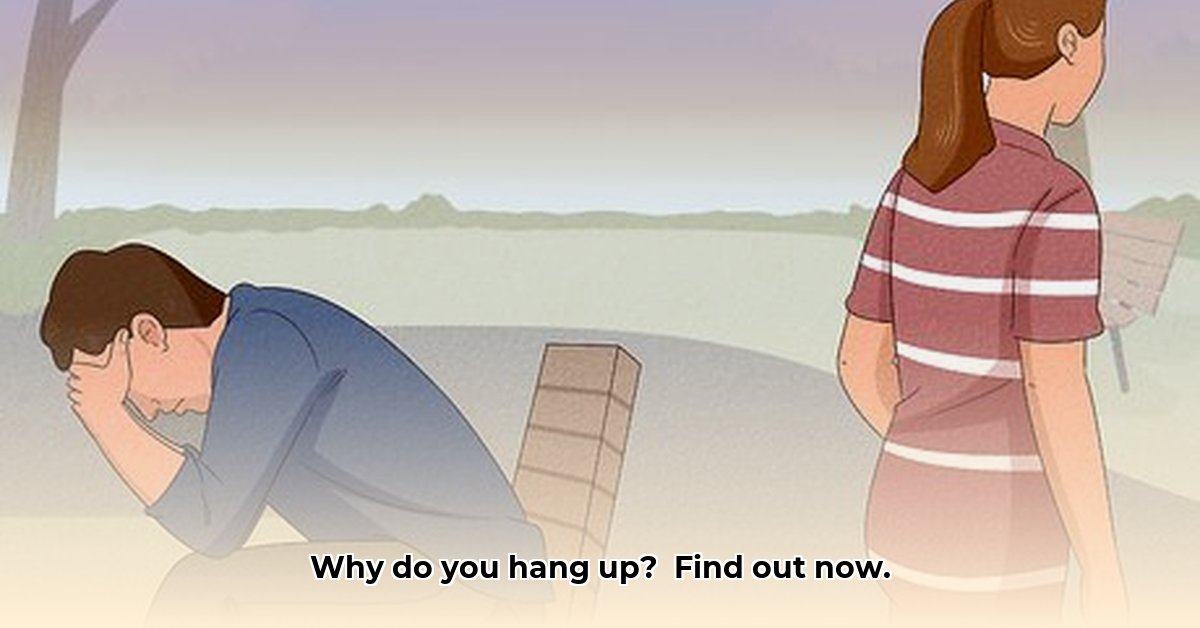
Hanging up the phone – it seems simple, right? But the impulse to abruptly end a call often reveals a deeper story about our emotions and how we handle conflict. This isn't just about bad manners; it's a window into our psychological responses to stress and difficult conversations. This article explores the psychology behind hanging up, offering insights and practical strategies for improving your communication skills. We'll examine emotion regulation, communication styles, attachment patterns, and the unique challenges of digital communication.
Understanding the "Why": Digging Deeper into Our Emotional Reactions
Why do we do it? Sometimes, it's a knee-jerk reaction. Imagine: you're on the phone with a friend relentlessly complaining, and frustration surges. Before you know it, you've ended the call, leaving hurt feelings. This isn't necessarily rudeness; it's often a subconscious response to overwhelming emotions.
Our brains are wired with a fight-or-flight response (our body's automatic reaction to perceived threats). When faced with intense emotions like anger, frustration, or feeling overwhelmed, our bodies react. Hanging up can feel like a quick escape, a way to avoid the discomfort of a tense situation. It might also be a passive-aggressive (indirectly expressing anger or displeasure) way of saying, "I'm not happy with this conversation."
Think about a time you hung up. What were you feeling? Likely, a mix of uncomfortable emotions. Were you anxious, irritated, or overwhelmed by the other person's perspective? Understanding these feelings is the first step towards changing your reaction. Did you feel a sense of relief after hanging up? This immediate feeling of relief can reinforce the behavior, even if it leads to regret later. What are the long-term consequences of this behavior on your relationships?
Recognizing Your Role: Taking a Look in the Mirror
Before improving communication with others, let's examine our own behavior. Are you someone who often ends calls abruptly? Self-awareness is key. Begin by honestly assessing your behavior:
- Frequency: How often does this happen?
- Emotional State: What's your emotional state beforehand? Are you stressed, angry, or overwhelmed?
- Conversation Triggers: What kinds of conversations trigger this? Specific topics or certain people?
- Consequences: Are your relationships affected? Do you feel guilty or regretful afterward?
This honest reflection will help identify patterns and triggers, paving the way for positive change. Keeping a journal to track these occurrences can be beneficial. Note the situation, your feelings, and the outcome. Are there recurring themes or individuals involved in these situations?
Actionable Strategies: Building Better Communication Skills
Now that we understand the "why," let's focus on practical solutions. These strategies will help navigate difficult conversations without resorting to abruptly ending calls:
Active Listening: Truly listen – don't just wait for your turn to speak. Focus on understanding their perspective, even if you disagree. Pay attention to words and tone. This involves paraphrasing their points to ensure comprehension and showing empathy.
Assertive Communication: Express your needs and feelings clearly and respectfully. "I" statements are powerful: Instead of "You always interrupt me," try "I feel unheard when interrupted." This technique helps avoid blame and fosters better understanding.
Time-Outs: Feeling overwhelmed? It's okay to take a break. Politely excuse yourself: "I need a minute to collect my thoughts. Can we continue this in a few minutes?" This demonstrates self-awareness and respect for the other person's time.
Setting Boundaries: Learn to say no. You don't have to engage in every conversation or tolerate disrespectful behavior. Setting boundaries protects your emotional well-being. This involves clearly communicating your limits and expectations.
Conflict Resolution: Disagreements are inevitable. Learn techniques to manage conflict constructively, focusing on finding common ground rather than winning an argument. This involves focusing on collaborative problem-solving rather than adversarial debate.
Navigating the Digital World: Ghosting and Other Online Challenges
The digital age adds complexity. Ghosting—disappearing without explanation—is a harsh reality. The lack of nonverbal cues can lead to misunderstandings. What might be a simple oversight in person feels like a deliberate snub online.
Here's how to improve digital communication:
Mindful Tone: Written communication lacks in-person nuance. What you write might not be interpreted as intended. Use emoticons and other cues sparingly to avoid misinterpretations.
Alternative Methods: Suggest a call or video chat for sensitive topics. This allows for richer nonverbal cues and a more nuanced understanding.
Direct Address: If you sense tension, address it directly rather than ignoring it. Honest communication is key. This proactive approach prevents misunderstandings from escalating.
When to Seek Professional Help: Knowing When to Ask for Support
If you consistently struggle with managing emotions during conversations, or if your tendency to hang up significantly impacts your relationships, seeking professional help is beneficial. A therapist can provide guidance on managing emotions and building healthier communication habits. Remember, asking for help is a sign of strength.
How to Overcome the Urge to Hang Up During a Difficult Conversation
Key Takeaways:
- Understanding the emotional drivers behind hanging up is crucial for developing coping strategies.
- Recognizing personal communication patterns empowers proactive management of difficult interactions.
- Implementing practical communication skills fosters healthier dialogue.
- Adapting these techniques to digital communication helps navigate online complexities.
- Seeking professional help enhances relationship well-being.